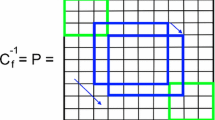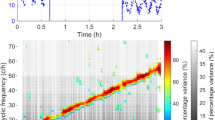Abstract
An evolutionary algorithm for parameter estimation of a kernel method for noisy and irregularly sampled time series is presented. We aim to estimate the time delay between time series coming from gravitational lensing in astronomy. The parameters to estimate include the delay, the width of kernels or smoothing, and a regularization parameter. We use mixed types to represent variables within the evolutionary algorithm. The algorithm is tested on several artificial data sets, and also on real astronomical observations. The performance of our method is compared with the most popular methods for time delay estimation. An statistical analysis of results is given, where the results of our approach are more accurate and significant than those of other methods.
Preview
Unable to display preview. Download preview PDF.
Similar content being viewed by others
References
Hastie, T., Tibshirani, R., Friedman, J.: The Elements of Statistical Learning: Data Mining, Inference, and Prediction. Springer, Heidelberg (2001)
Shawe-Taylor, J., Cristianini, N.: Kernel Methods for Pattern Analysis. Cambridge University Press, Cambridge (2004)
Rowe, J., Hidovic, D.: An evolution strategy using a continuous version of the gray-code neighbourhood distribution. In: Deb, K., et al. (eds.) GECCO 2004. LNCS, vol. 3102, pp. 725–736. Springer, Heidelberg (2004)
Pelt, J., Kayser, R., Refsdal, S., Schramm, T.: The light curve and the time delay of QSO 0957+561. Astronomy and Astrophysics 305(1), 97–106 (1996)
Kundic, T., Turner, E., Colley, W., Gott-III, J., Rhoads, J., Wang, Y., Bergeron, L., Gloria, K., Long, D., Malhorta, S., Wambsganss, J.: A robust determination of the time delay in 0957+561A,B and a measurement of the global value of Hubble’s constant. Astrophysical Journal 482(1), 75–82 (1997)
Press, W., Rybicki, G., Hewitt, J.: The time delay of gravitational lens 0957+561, I. Methodology and analysis of optical photometric data. Astrophysical Journal 385(1), 404–415 (1992)
Harva, M., Raychaudhury, S.: Bayesian estimation of time delays between unevenly sampled signals. In: IEEE International Workshop on Machine Learning for Signal Processing, pp. 111–122. IEEE Computer Society Press, Los Alamitos (2006)
Ovaldsen, J., Teuber, J., Schild, R., Stabell, R.: New aperture photometry of QSO 0957+561; application to time delay and microlensing. Astronomy and Astrophysics 402(3), 891–904 (2003)
Cuevas-Tello, J., Tiňo, P., Raychaudhury, S.: How accurate are the time delay estimates in gravitational lensing? Astronomy and Astrophysics 454, 695–706 (2006)
Cuevas-Tello, J., Tiňo, P., Raychaudhury, S.: A kernel-based approach to estimating phase shifts between irregularly sampled time series: an application to gravitational lenses. In: Fürnkranz, J., Scheffer, T., Spiliopoulou, M. (eds.) ECML 2006. LNCS (LNAI), vol. 4212, pp. 614–621. Springer, Heidelberg (2006)
Press, W., Teukolsky, S., Vetterling, W., Flannery, B.: Numerical Recipes in C++: The Art of Scientific Computing, 2nd edn. Cambridge University Press, Cambridge (2002)
Goldberg, D.: Genetic Algorithms in Search, Optimization, and Machine Learning. Addison-Wesley, Reading (1989)
Chipperfield, A.J., Fleming, P.J., Pohlheim, H., Fonseca, C.M.: Genetic Algorithm Toolbox for use with MATLAB. Automatic Control and Systems Engineering, University of Sheffield. 1.2 edn. (1996), http://www.shef.ac.uk/acse/research/ecrg/getgat.html
Kochanek, C.S., Schechter, P.L.: The Hubble Constant from Gravitational Lens Time Delays. In: Freedman, W.L. (ed.) Measuring and Modeling the Universe, p. 117 (2004)
Giel, O., Lehre, P.: On the effect of populations in evolutionary multi-objective optimization. In: Keijzer, M., et al. (eds.) Genetic and Evolutionary Computation Conference (GECCO), vol. 1, pp. 651–658. ACM Press, New York (2006)
Author information
Authors and Affiliations
Editor information
Rights and permissions
Copyright information
© 2007 Springer-Verlag Berlin Heidelberg
About this paper
Cite this paper
Cuevas-Tello, J.C. (2007). Evolved Kernel Method for Time Series. In: Gelbukh, A., Kuri Morales, Á.F. (eds) MICAI 2007: Advances in Artificial Intelligence. MICAI 2007. Lecture Notes in Computer Science(), vol 4827. Springer, Berlin, Heidelberg. https://doi.org/10.1007/978-3-540-76631-5_53
Download citation
DOI: https://doi.org/10.1007/978-3-540-76631-5_53
Publisher Name: Springer, Berlin, Heidelberg
Print ISBN: 978-3-540-76630-8
Online ISBN: 978-3-540-76631-5
eBook Packages: Computer ScienceComputer Science (R0)




